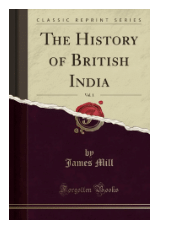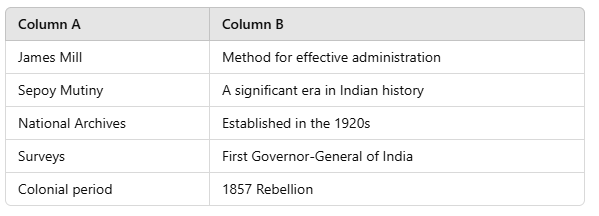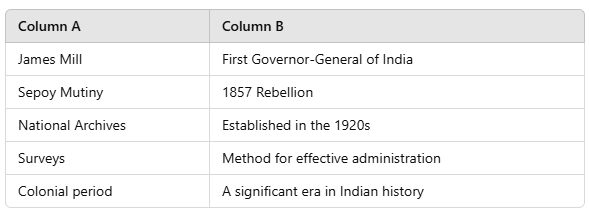How, When and Where Class 8 Worksheet History Chapter 1
| Table of contents |

|
| Multiple Choice Questions (MCQs) |

|
| Fill in the Blanks |

|
| True/False |

|
| Match the Following |

|
| Very Short Answer Questions |

|
Multiple Choice Questions (MCQs)
Q1: Which event is associated with the year 1946 in the context of the British administration in India?
A) Establishment of the National Archives
B) The Royal Indian Navy mutiny
C) Introduction of the census
D) The first Governor-General's rule
Ans: B) The Royal Indian Navy mutiny
Q2: Who published "A History of British India"?
A) Warren Hastings
B) James Mill
C) Lord Mountbatten
D) Robert Clive
Ans: B) James Mill
Q3: What was one of the significant aspects of British colonial rule?
A) Manipulating trade for their benefit.
B) Establishing control over the economy, society, and governance.
C) Exploiting resources and producing crops for export.
D) All of the above.
Ans. D) All of the above.
Q4: Why do historians question the validity of labeling historical periods solely as "Hindu" or "Muslim"?
A) Because it aligns with modern political ideologies.
B) Because such labels do not accurately reflect the complex interplay of diverse faiths and rulers' varying beliefs.
C) Because these terms were not used historically.
D) Because it simplifies history too much, making it easier for students to understand.
Ans. B) Because such labels do not accurately reflect the complex interplay of diverse faiths and rulers' varying beliefs.
Fill in the Blanks
Q1: James Mill divided Indian history into three periods: Hindu, Muslim, and __________.
Ans: James Mill divided Indian history into three periods: Hindu, Muslim, and British.
Q2: The British established __________ to preserve important records.
Ans: The British established record rooms to preserve important records.
Q3: The __________ was a significant rebellion against British rule in 1857.
Ans: The Sepoy Mutiny was a significant rebellion against British rule in 1857.
Q4: Surveys conducted by the British included __________ surveys to understand local conditions.
Ans: Surveys conducted by the British included revenue surveys to understand local conditions.
Q5: The term __________ is often used to describe the period of British rule in India.
Ans: The term colonial is often used to describe the period of British rule in India.
True/False
Q1: Historically, history was often equated with memorizing dates related to royal coronations and battles.
Ans. True
Q2: James Mill's perspective on Indian history was criticized for being Western-centric and for overlooking the coexistence of diverse faiths in India.
Ans. True
Q3: Official records always provide a complete and unbiased view of historical events.
Ans. False (Official records reflect the views and interests of those who produced them, and they do not always reveal the sentiments or motivations of the general populace.)
Q4: Colonial rule uniformly affected all classes and groups in the colonized regions.
Ans. False (Colonial influences varied among different classes and groups, resulting in diverse experiences and impacts.)
Q5: Diaries, pilgrims' accounts, and newspapers are considered alternative historical sources that offer deeper insights into the past.
Ans. True
Match the Following
 Ans:
Ans: 
Very Short Answer Questions
Q1: Why do many historians refer to modern period as colonial?
Ans. Under British rule people did not have equality, freedom or liberty. Nor was the period one of economic growth and progress. Many historians therefore refer to this period as ‘colonial’.
Q2: When The National Archives of India came up?
Ans. The National Archives of India came up in the 1920s.
Q3: Mention the events for which specific dates can be determined.
Ans. The year a king was crowned, the year he married, the year he had a child, the year he fought a particular war, the year he died, and the year the next ruler succeeded to the throne.
Q4: How did paintings project Governor-Generals?
Ans. Paintings projected Governor-Generals as powerful figures.
Q5: What were the things that official records did not tell?
Ans. Official records do not always help us understand what other people in the country felt, and what lay behind their actions.
Q6: Who became the first governor general of British India?
Ans. Warren Hastings became the first Governor-General of India in 1773.
Q7: What did James Mills think about all Asian societies?
Ans. Mill thought that all Asian societies were at a lower level of civilisation than Europe.
Q8: How have historians divided Indian history?
Ans. Historians have usually divided Indian history into ‘ancient’, ‘medieval’ and ‘modern’.
Q9: What do you mean by the term ' colonisation'?
Ans. When one country subjugate another country which leads to political, economic, social and cultural changes refer to colonisation.
Q10: Who was James Mill?
Ans. James Mill was a Scottish economist and political philosopher, who published a massive three-volume work, A History of British India.
Q11: Who wrote the book ‘A History of British India’?
Ans. In 1817, James Mill, a Scottish economist and political philosopher, published a massive three-volume work, A History of British India.
Q12: What do you understand by history?
Ans. History is certainly about changes that occur over time. It is about finding out how things were in the past and how things have changed.
|
69 videos|431 docs|46 tests
|
FAQs on How, When and Where Class 8 Worksheet History Chapter 1
| 1. What are the key components of a Class 8 exam preparation strategy? |  |
| 2. How can I effectively study for multiple-choice questions (MCQs) in Class 8? |  |
| 3. What are some common topics covered in Class 8 worksheets? |  |
| 4. How can I improve my performance in fill-in-the-blank questions? |  |
| 5. What should I do if I find true/false questions challenging? |  |





















